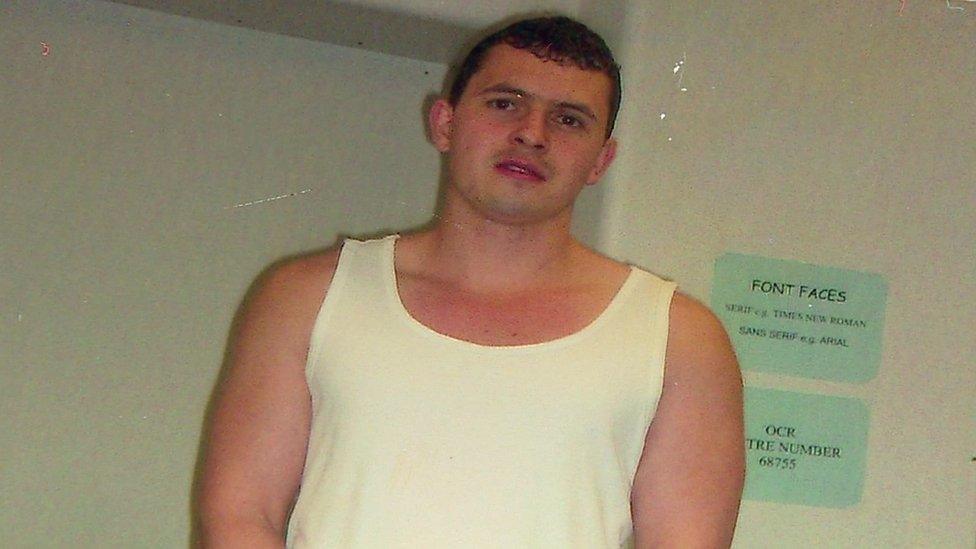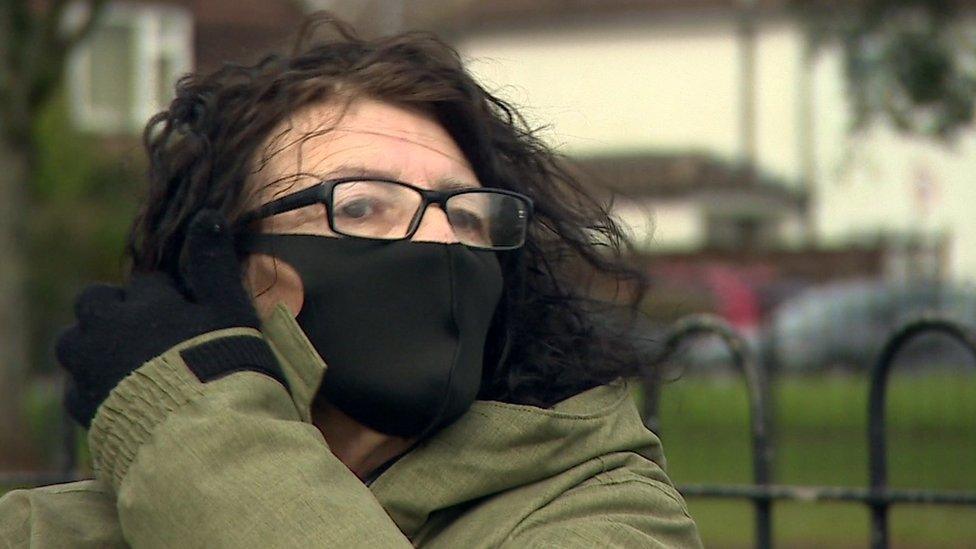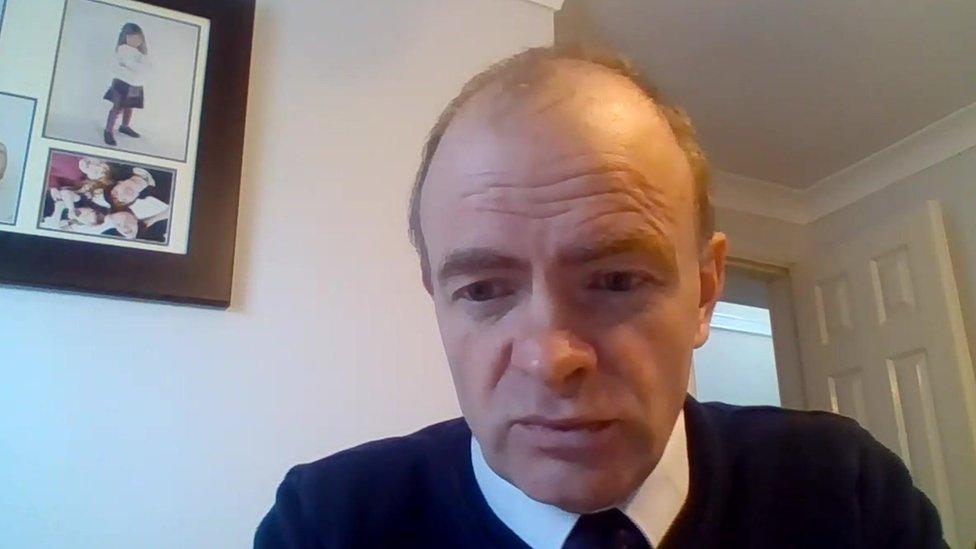Prisoner served 10 years for mobile phone theft
- Published
Martin Tawton was handed an imprisonment for public protection sentence
The Parole Board's chief executive has spoken about the "difficult legacy" imprisonment for public protection sentences (IPP) sentences has left.
Despite being scrapped in 2012, nearly 2,000 prisoners are still being detained on such sentences.
IPPs were intended for the most dangerous offenders but Martin Jones said others got "caught up".
The Ministry of Justice said it was helping IPP inmates progress towards release while ensuring public safety.
Unlike other sentences, IPPs do not have a fixed term, meaning prisoners have no idea when they will be released.
Once they are, they are on licence for life. Rates for recall back to prison are high, as many battle with mental health and addiction problems.
The Parole Board said it has a duty to protect the public from those who pose a significant risk, and while the number of IPPs had fallen by about 70% in recent years, he had "lingering concerns about that small group of people with very short tariffs".
"That's the difficulty of IPPs - there's no end to this," he said.
"They can be lawfully kept in prison for the rest of their lives, unless the parole board decide they are safe to be released.
"How do you break free of that cycle of somebody whose mental health has deteriorated in prison, to get to the point where you could safely be released?
"There's a huge waste of people's lives as a result of this."

Martin Tawton was initially given a minimum sentence of three and-a-half years
Martin served 10 years for a 42-month minimum sentence
Eight weeks after they were introduced, then 24-year-old Martin Tawton, from Cardiff was sentenced to an IPP sentence for street robbery after stealing a mobile phone.
He was given a minimum term of three and a half years, but as many IPP prisoners found, there were lengthy waits to complete the training courses required before the Parole Board would consider release.
He eventually served 10 years.
"If he'd have been sentenced eight weeks earlier, he would have been home a long time ago," says his mum, Sue Hennessy.
"His life would have been back together."
But that decade changed him, she said. "It wears you down, never knowing when you're going to come home. There's no hope for you.
"You see other prisoners coming in for similar, if not the same offences, doing their time and going home, whilst the IPPs are left waiting for courses, or to go to other prisons to do these courses."

Sue Hennessy says IPPs offer "no hope"
Since release in 2015, Martin, now 40, is on licence for life and has been recalled three times for failing to comply with his conditions.
Currently he is in HMP Cardiff, waiting to be transferred to HMP Parc to complete a course, before the Parole Board will consider releasing him.
"The things he's getting recalled for are things that could be dealt with in the community," said Sue, citing times when he had stayed with her, instead of the hostel, and most recently because he had aroused suspicion because he was found in possession of a bicycle and was smelling of alcohol.
"He took a bike out of a skip," she said. "He had visions of putting it back together so that he could come and see me, but they assumed he'd stolen it.
"If they'd asked him, it could have been sorted, nevertheless he was recalled for that."

Parole Board chief executive Martin Jones said IPPs have been "toxic"
Mr Jones said the way in which the sentence has worked has been "particularly toxic" and suggested a number of changes could be considered, including:
Resentencing exercise for those given shorter minimum terms
Review whether offenders still need to be on licence after two years, instead of the current 10 years
Introduce a fixed, 28 day recall period to better determine risk
The sentences were introduced in 2005 and scrapped seven years later - "an indictment" of their lack of success, said Mr Jones.

What is an IPP?
It is a minimum sentence and the prisoner must demonstrate to a parole board that they are no longer a risk to the public before they can be released.
Introduced by the Labour government in 2005, it was designed for serious violent and sexual offenders.
Ministers thought it would affect 900 offenders in total but it was applied far more widely, and at its peak there were 6,000 IPP prisoners.
The sentence was abolished in 2012 by then Justice Secretary Ken Clarke.
He said that it was impossible for prisoners to prove that they were no longer a risk, calling IPPs a "stain" on the criminal justice system.

There are 1,849 prisoners still serving IPP sentences, 95% of whom (1,754) are post-tariff, meaning they have served longer than the minimum term set by a judge.
Of these, 200 were sentenced to less than two years, but are 10 years or more over tariff.
In one example, a person was given a minimum term of 28 days.
"It's quite extraordinary to suggest that person is going to serve 28 days for punishment and then potentially spend the rest of their life in prison at the mercy of the Parole Board," said Martin Jones.
"Thousands of IPPs have been moved safely on to being released and the overwhelming majority do not commit a serious offence after being released. Our serious offending rate is less than 1%."
He has no doubt the sentence is appropriate for some offenders, who remain a serious risk to the public - the likes of Baby P's mum, Tracey Connelly or black cab rapist John Worboys.
A serious further offence committed by an IPP offender only serves to highlight the risks being weighed - Usman Khan was on licence from an IPP sentence when he went on to kill two people on London Bridge in 2019.
However, he feels they are likely to be in the minority.
'Catch 22 situation'
He said: "Ten years on from the abolition of the sentence, maybe people do need to look at what the final legacy of the sentence would be to ensure that it's working in the way that everybody working in the justice system - and indeed parliamentarians - are happy with.
"Because if not, I could see the number of IPPs in prison remaining well over 1,000 for some years to come, and that would be deeply troubling."
He said resentencing those who had originally been given shorter minimum terms could be an option.
"It's absolutely true to say that many of the people suffering the deepest problems is because they need help with their mental health and that's something which the system needs to be better in doing.
"The biggest concern is a loss of hope. There are many opportunities in prison to make poor choices. If you went into prison because you were committing offences because you had a drug addiction, and we look at you 10 years later and you've still got a serious problem, that makes it very difficult for us to make a decision that person remains safe to be released. It's a Catch 22 situation."

Many IPP prisoners end up spending years over their tariff inside
As for recalls, "I certainly see some real problems with IPP recalls," he said.
"The numbers are actually quite frightening - it's around 1,300 IPPs that are now back in custody on recall. When those are reviewed by the Parole Board, we find around 70% are re-released.
"It is possible for an IPP to seek an end of their license period after 10 years in the community. That's a long time," he said, suggesting two or five years as an alternative.
A Ministry of Justice spokesperson said: "The number of IPP prisoners has fallen by two-thirds since 2012 - and is down 13% in the last year.
"We are helping those still in custody progress towards release, but as a judge has deemed them to be a high risk to the public, extra measures are in place to ensure they are safe to leave prison."